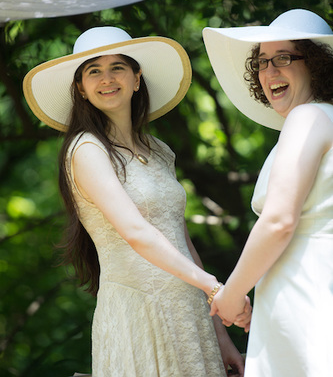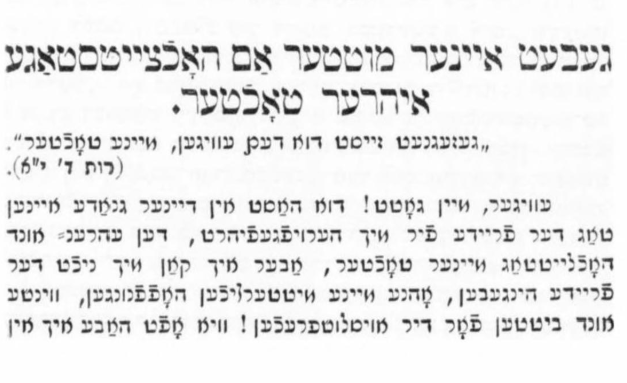There are all sorts of customs associated with weddings in Judaism. But one custom that has been practiced for a long time and deserves a comeback is the additions to the Torah reading for Shabbat Kallah. Shabbat Kallah, the Shabbat in the “Sheva Berakhot” week after the wedding, is in many Sephardic communities preferred over Shabbat Ḥatan, the aufruf Shabbat before the wedding. And in all sorts of communities across the Jewish world, there have been customs for specific readings for Shabbat Kallah, treating it as a Special Sabbath in its own right. Traditionally this special maftir and haftarah would recited by the groom (along with an Aramaic translator interpolating for the maftir). The maftir is from the story of Abraham’s servant tasked with finding a wife for Isaac, and the haftarah is from the book of Isaiah and compares a groom and bride to the relationship between God and Israel.
Note: “The CAUSE” is used to translate the Divine Name YHVH, based on the philosophical idea of God as the Prime Mover and on the interpretation of the Name as a causative form of the copula – “causes to be.”
| Source (Hebrew) | Targum (Aramaic) | Translation (English) |
|---|---|---|
מפטיר— בראשית כד:א-ז, והמתורגמן מתרגם בתרגום |
Maftir — Genesis 24:1-7, with additional reader reciting interpolated Aramaic translation | |
וְאַבְרָהָ֣ם זָקֵ֔ן בָּ֖א בַּיָּמִ֑ים וַֽיהֹוָ֛ה בֵּרַ֥ךְ אֶת־אַבְרָהָ֖ם בַּכֹּֽל׃ |
וְאַבְרָהָ֣ם סִ֔יב עָ֖אל בְּיוֹמִ֑ין וַֽיהֹוָ֛ה בָּרֵ֥יךְ יָת־אַבְרָהָ֖ם בְּכֽוֹלָא׃ |
And Avraham was old, coming up in years, and the CAUSE had blessed Avraham in all. |
וַיֹּ֣אמֶר אַבְרָהָ֗ם אֶל־עַבְדּוֹ֙ זְקַ֣ן בֵּית֔וֹ הַמֹּשֵׁ֖ל בְּכׇל־אֲשֶׁר־ל֑וֹ שִֽׂים־נָ֥א יָדְךָ֖ תַּ֥חַת יְרֵכִֽי׃ |
וַאֲמַ֣ר אַבְרָהָ֗ם לְעַבְדֵּיהּ֙ סָבָ֣א דְּבֵיתֵ֔יהּ דְּשַׁלִּ֖יט בְּכׇל־דְּלֵ֑יהּ שַֽׁו־כְּעַ֥ן יְדָ֖ךְ תְּח֥וֹת יִרְכִּֽי׃ |
And Avraham said to his servant, his chief of staff who oversaw all that was his, “Set your hand under my ‘testimony.’ |
וְאַשְׁבִּ֣יעֲךָ֔ בַּֽיהֹוָה֙ אֱלֹהֵ֣י הַשָּׁמַ֔יִם וֵֽאלֹהֵ֖י הָאָ֑רֶץ אֲשֶׁ֨ר לֹֽא־תִקַּ֤ח אִשָּׁה֙ לִבְנִ֔י מִבְּנוֹת֙ הַֽכְּנַעֲנִ֔י אֲשֶׁ֥ר אָנֹכִ֖י יוֹשֵׁ֥ב בְּקִרְבּֽוֹ׃ |
וַאֲקַיֵּים־עֲלָךְ֙ בְּמֵימְרָא־דַּיְהֹוָה֙ אֱלָ֣הָא דִּשְׁמַ֔יָּא וֵאלָ֖הָא דְּאַ֑רְעָא דְּלָ֨א תִּסַּ֤ב אִתְּתָא֙ לִבְרִ֔י מִבְּנָת֙ כְּנַעֲנָאֵ֔י דַּ֥אֲנָ֖א יָתֵ֥יב בֵּינֵיהֽוֹן׃ |
And I will swear to you by the CAUSE, God of Heaven and God of Earth, that you shall not take a wife for my son from the daughters of the Canaanites among whom I dwell. |
כִּ֧י אֶל־אַרְצִ֛י וְאֶל־מוֹלַדְתִּ֖י תֵּלֵ֑ךְ וְלָקַחְתָּ֥ אִשָּׁ֖ה לִבְנִ֥י לְיִצְחָֽק׃ |
אֱלָהֵ֧ין לְאַרְעִ֛י וּלְיַלָּדוּתִ֖י תֵּיזֵ֑יל וְתִסַּ֥ב אִתְּתָ֖א לִבְרִ֥י לְיִצְחָֽק׃ |
Rather to my homeland and my birthplace you will go, and take a wife for my son, for Yitsḥaq.” |
וַיֹּ֤אמֶר אֵלָיו֙ הָעֶ֔בֶד אוּלַי֙ לֹא־תֹאבֶ֣ה הָֽאִשָּׁ֔ה לָלֶ֥כֶת אַחֲרַ֖י אֶל־הָאָ֣רֶץ הַזֹּ֑את הֶֽהָשֵׁ֤ב אָשִׁיב֙ אֶת־בִּנְךָ֔ אֶל־הָאָ֖רֶץ אֲשֶׁר־יָצָ֥אתָ מִשָּֽׁם׃ |
וַאֲמַ֤ר לֵיהּ֙ עַ֔בְדָּא מָאִם֙ לָא־תֵּיבֵ֣י אִתְּתָ֔א לְמֵיתֵ֥י בָּתְרַ֖י לְאַ֣רְעָא הָדָ֑א הַאָתָבָ֤א אָתִיב֙ יָת־בְּרָ֔ךְ לְאַ֖רְעָא דִּנְפַ֥קְתָּא מִתַּמָּֽן׃ |
And the servant said to him, “Maybe the woman won’t want to go after me to this land! Should I then take, take your son to the land from where you came?” |
וַיֹּ֥אמֶר אֵלָ֖יו אַבְרָהָ֑ם הִשָּׁ֣מֶר לְךָ֔ פֶּן־תָּשִׁ֥יב אֶת־בְּנִ֖י שָֽׁמָּה׃ |
וַאֲמַ֥ר לֵ֖יהּ אַבְרָהָ֑ם אִסְתְּמַ֣ר לָ֔ךְ דִּלְמָא־תָּתִ֥יב יָת־בְּרִי לְתַמָּֽן׃ |
And Abraham said to him, “Don’t you dare bring my son back there! |
יְהֹוָ֣ה ׀ אֱלֹהֵ֣י הַשָּׁמַ֗יִם אֲשֶׁ֨ר לְקָחַ֜נִי מִבֵּ֣ית אָבִי֮ וּמֵאֶ֣רֶץ מֽוֹלַדְתִּי֒ וַאֲשֶׁ֨ר דִּבֶּר־לִ֜י וַאֲשֶׁ֤ר נִֽשְׁבַּֽע־לִי֙ לֵאמֹ֔ר לְזַ֨רְעֲךָ֔ אֶתֵּ֖ן אֶת־הָאָ֣רֶץ הַזֹּ֑את ה֗וּא יִשְׁלַ֤ח מַלְאָכוֹ֙ לְפָנֶ֔יךָ וְלָקַחְתָּ֥ אִשָּׁ֛ה לִבְנִ֖י מִשָּֽׁם׃ |
יְהֹוָ֣ה ׀ אֱלָ֣הָא דִּשְׁמַ֗יָּא דְּדַבְרַ֜נִי מִבֵּ֣ית אַ֘בָּא֮ וּמֵאֲרַ֣ע יַלָּדוּתִי֒ וּ֨דְמַלֵּֽיל לִ֜י וּ֤דְקַיֵּֽים לִי֙ לְמֵימַ֔ר לִ֙בְנָ֔ךְ אֶתֵּ֖ין יָת־אַ֣רְעָא הָדָ֑א ה֗וּא יִשְׁלַ֤ח מַלְאֲכֵיהּ֙ קֳדָמָ֔ךְ וְתִסַּ֥ב אִתְּתָ֛א לִבְרִ֖י מִתַּמָּֽן׃ |
The CAUSE, God of Heaven, who took me from my father’s house and my birthplace’s land, and who said to me and who swore to me to wit: ‘To your seed I will give this land,’ that very One will send a divine messenger before you, and you will take a wife for my son from there.” |
| Source (Hebrew) | Translation (English) |
|---|---|
קריאת ההפטרה. אם אחרי הפטרה רגילה, ישעיהו סא:י-סב:ה. אם במקום הפטרה רגילה, ישעיהו סא:י-סב:ח. איטלקים קוראין, ישעיהו סא:ט-סב:ט. |
Haftarah: If read after the standard haftarah, Isaiah 61:10-62:5. If read in place of the standard haftarah, Isaiah 61:10-62:8. Italian communities read an additional verse at the beginning and end, Isaiah 61:9-62:9. |
איטלקים מתחילין כאן — |
Italian communities start here — |
וְנוֹדַ֤ע בַּגּוֹיִם֙ זַרְעָ֔ם וְצֶאֱצָאֵיהֶ֖ם בְּת֣וֹךְ הָעַמִּ֑ים כׇּל־רֹֽאֵיהֶם֙ יַכִּיר֔וּם כִּ֛י הֵ֥ם זֶ֖רַע בֵּרַ֥ךְ יְהֹוָֽה׃ |
And their seed shall among the nations be known, and their descendants in the midst of the peoples; all who see them will recognize them, for they are the seed blessed by the CAUSE. |
רוב קהילות מתחילין כאן — |
Most communities start here — |
שׂ֧וֹשׂ אָשִׂ֣ישׂ בַּֽיהֹוָ֗ה תָּגֵ֤ל נַפְשִׁי֙ בֵּֽאלֹהַ֔י כִּ֤י הִלְבִּישַׁ֙נִי֙ בִּגְדֵי־יֶ֔שַׁע מְעִ֥יל צְדָקָ֖ה יְעָטָ֑נִי כֶּֽחָתָן֙ יְכַהֵ֣ן פְּאֵ֔ר וְכַכַּלָּ֖ה תַּעְדֶּ֥ה כֵלֶֽיהָ׃ כִּ֤י כָאָ֙רֶץ֙ תּוֹצִ֣יא צִמְחָ֔הּ וּכְגַנָּ֖ה זֵרוּעֶ֣יהָ תַצְמִ֑יחַ כֵּ֣ן ׀ אֲדֹנָ֣י יֱהֹוִ֗ה יַצְמִ֤יחַ צְדָקָה֙ וּתְהִלָּ֔ה נֶ֖גֶד כׇּל־הַגּוֹיִֽם׃ |
I will rejoice, rejoice in the CAUSE, my essence will exult in my God; for God has clothed me in salvation garb, wrapped me in a wrapping of righteousness, like a groom headdress-ministered, and like a bride adorned with her vessels. For like the earth bringing forth its shoots, and like a garden sprouting up it seeds, thus my Lord CAUSE sprouts up righteousness and praise by all the nations. |
לְמַ֤עַן צִיּוֹן֙ לֹ֣א אֶחֱשֶׁ֔ה וּלְמַ֥עַן יְרוּשָׁלִַ֖ם לֹ֣א אֶשְׁק֑וֹט עַד־יֵצֵ֤א כַנֹּ֙גַהּ֙ צִדְקָ֔הּ וִישׁוּעָתָ֖הּ כְּלַפִּ֥יד יִבְעָֽר׃ וְרָא֤וּ גוֹיִם֙ צִדְקֵ֔ךְ וְכׇל־מְלָכִ֖ים כְּבוֹדֵ֑ךְ וְקֹ֤רָא לָךְ֙ שֵׁ֣ם חָדָ֔שׁ אֲשֶׁ֛ר פִּ֥י יְהֹוָ֖ה יִקֳּבֶֽנּוּ׃ וְהָיִ֛ית עֲטֶ֥רֶת תִּפְאֶ֖רֶת בְּיַד־יְהֹוָ֑ה וצנוף וּצְנִ֥יף מְלוּכָ֖ה בְּכַף־אֱלֹהָֽיִךְ׃ לֹא־יֵאָמֵר֩ לָ֨ךְ ע֜וֹד עֲזוּבָ֗ה וּלְאַרְצֵךְ֙ לֹֽא־יֵאָמֵ֥ר עוֹד֙ שְׁמָמָ֔ה כִּ֣י לָ֗ךְ יִקָּרֵא֙ חֶפְצִי־בָ֔הּ וּלְאַרְצֵ֖ךְ בְּעוּלָ֑ה כִּֽי־חָפֵ֤ץ יְהֹוָה֙ בָּ֔ךְ וְאַרְצֵ֖ךְ תִּבָּעֵֽל׃ כִּֽי־יִבְעַ֤ל בָּחוּר֙ בְּתוּלָ֔ה יִבְעָל֖וּךְ בָּנָ֑יִךְ וּמְשׂ֤וֹשׂ חָתָן֙ עַל־כַּלָּ֔ה יָשִׂ֥ישׂ עָלַ֖יִךְ אֱלֹהָֽיִךְ׃ |
For Tsion’s sake I will not hush, and for Jerusalem’s sake I will not quiet down, until her righteousness comes out as aglow, her salvation like a torch aflame. And nations will see your righteousness, and call kings your glory, and you will be called a new name which the very Word of the CAUSE will designate. And you shall be a crown of glory in the hand of the CAUSE, and a diadem of sovereignty in the palm of your God. And no more will they call you abandoned, nor shall they ever again call your land desolate, but they will call you “I-Cherish-Her” and your land “Wedded,” for the CAUSE cherishes you and your land will be wedded. For as a lad weds a maid, your children will wed you, and as a groom rejoices over a bride, your God will rejoice over you. |
אם אחרי הפטרה רגילה, קוראין עד כאן. |
If read after the standard haftarah, we finish here. |
אם במקום הפטרה רגילה, מוסיפין — |
If read in place of the standard haftarah, continue — |
עַל־חֽוֹמֹתַ֣יִךְ יְרוּשָׁלִַ֗ם הִפְקַ֙דְתִּי֙ שֹֽׁמְרִ֔ים כׇּל־הַיּ֧וֹם וְכׇל־הַלַּ֛יְלָה תָּמִ֖יד לֹ֣א יֶחֱשׁ֑וּ הַמַּזְכִּרִים֙ אֶת־יְהֹוָ֔ה אַל־דֳּמִ֖י לָכֶֽם׃ וְאַֽל־תִּתְּנ֥וּ דֳמִ֖י ל֑וֹ עַד־יְכוֹנֵ֞ן וְעַד־יָשִׂ֧ים אֶת־יְרוּשָׁלִַ֛ם תְּהִלָּ֖ה בָּאָֽרֶץ׃ נִשְׁבַּ֧ע יְהֹוָ֛ה בִּימִינ֖וֹ וּבִזְר֣וֹעַ עֻזּ֑וֹ אִם־אֶתֵּן֩ אֶת־דְּגָנֵ֨ךְ ע֤וֹד מַֽאֲכָל֙ לְאֹ֣יְבַ֔יִךְ וְאִם־יִשְׁתּ֤וּ בְנֵֽי־נֵכָר֙ תִּֽירוֹשֵׁ֔ךְ אֲשֶׁ֥ר יָגַ֖עַתְּ בּֽוֹ׃ |
Over your walls, Jerusalem, I have entrusted guardians, who will all day and all night never hush; o you who remind the CAUSE, do not cease! And give no cease to the One, until God establishes and sets Jerusalem as praise upon the earth. And the CAUSE swore by God’s own Right Hand and Strong Arm, “I would never again give your grain to your enemies, and I would never let foreigners drink the new wine that you labored for!” |
עד כאן ברוב קהילות, ואיטלקים מוסיפין |
Most communities finish here, but Italians continue — |
כִּ֤י מְאַסְפָיו֙ יֹאכְלֻ֔הוּ וְהִֽלְל֖וּ אֶת־יְהֹוָ֑ה וּמְקַבְּצָ֥יו יִשְׁתֻּ֖הוּ בְּחַצְר֥וֹת קׇדְשִֽׁי׃ |
Rather, those who harvest it will eat it, and praise the CAUSE, and those who gather it will drink it in My sacred courtyards. |

“📜 תוספות לקריאות התורה לשבת כלה (אחרי החתונה) | Additions to the Torah Reading for Shabbat Kallah (after the wedding)” is shared through the Open Siddur Project with a Creative Commons Attribution-ShareAlike 4.0 International copyleft license.









Leave a Reply